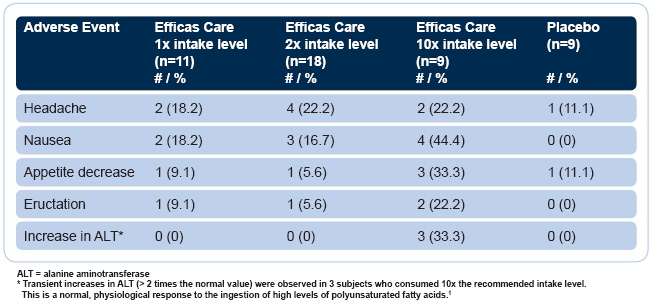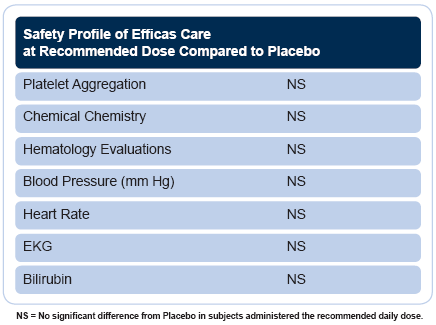Efficacy & Safety
EFFICACY
PROVEN EFFICACY IN MULTIPLE CLINICAL STUDIES AND DEMONSTRATED QUALITY OF LIFE IMPROVEMENTS FOR ASTHMA SUFFERERS

Efficas Care is a novel dietary-management product for reducing leukotriene production. Clinical studies with people who suffer from asthma demonstrate that Efficas care reduces leukotrienes. Consumer studies demonstrated that asthmatics slept better, experienced less wheezing and shortness of breath, and engaged in more physical activities.
The medical food Efficas Care and its ingredients have been tested for efficacy, safety, and bioavailability in six clinical studies.Efficas Care is:
- An emulsion containing two naturally occurring fatty acids GLA and EPA in an optimal 3:2 ratio
- Clinically proven to reduce the production of leukotrienes
- Clinically proven to be safe and well tolerated
- Demonstrated to reduce asthma symptoms
- Demonstrated to improve quality of life
- Non-steroidal
- Convenient to use once per day
SAFETY
PROVEN SAFETY IN MULTIPLE CLINICAL STUDIES
Efficas care demonstrated a favorable safety profile and was well tolerated in multiple clinical and quality of life studies involving 701 participants.
In the clinical studies there were no differences between the group consuming Efficas Care at the recommended amount and the group consuming placebo in the following parameters:
- Vital signs
- Clinical laboratory values
- Treatment-emergent adverse events
All adverse events were of mild to moderate intensity and resolved without concomitant therapy.
The most common treatment-emergent adverse events in each study group by number and percent (%) of subjects. (Study 3)


• Study 1: A 21-day, diet controlled, outpatient, open label trial in 16 healthy subjects conducted at Wake Forest University School of Medicine. Fatty acids levels, leukotriene levels and safety/tolerability were assessed.
• Study 2: A 21-day, outpatient, open label trial in 30 healthy subjects conducted at Wake Forest University School of Medicine. Fatty acids levels, leukotriene levels, pharmacokinetics and safety/tolerability were assessed.
• Study 3: A 14-day, single-center, randomized, double-blind, placebo-controlled, parallel-group escalating-intake inpatient clinical trial in healthy adults conducted in a Phase I unit. Patient population included thirty non-smoking, healthy male and female subjects aged between 18 and 45 years and within 15% of ideal body weight. Fatty acid levels, leukotriene levels and safety/tolerability were assessed.
• Study 4: A 28-day, single-center, randomized, double-blind, placebo-controlled, parallel-group prospective efficacy clinical trial in patients with mild to moderate asthma conducted at Wake Forest University School of Medicine. Patient population included 43 adult patients age 15 to 65 years. All patients had a diagnosis of asthma for at least one year and controlled their symptoms with beta-agonists and/or theophylline only. They also had a positive result on the methacholine challenge test as indicated by a PC20 of <8mg/ml, and a FEV1 > 70% of the predicted value. No patient could have taken inhaled or systemic steroids for = 4 weeks before study enrollment. Fatty acid levels, leukotriene levels and safety/tolerability were assessed. Preliminary assessment of quality of life impact was also made.
• Study 5: A multi-center pediatric pharmacokinetics trial conducted to determine the optimal intake for pediatric populations. Population consisted of 23 children aged to 6 to 11 and 12 to 17, with asthma. Twenty-two subjects had rhinitis/hay fever, and four subjects had dermatitis/eczema.
• Study 6: A 28-day, two-center, randomized, double-blind, placebo-controlled, parallel-group prospective study was conducted in adult subjects with asthma, allergic rhinitis or allergic eczema. Population consisted of males and females aged 18 – 65 years. Fatty acids levels, leukotriene levels, quality of life and safety/tolerability were assessed.
• Consumer Study: A 28-day, nation-wide, open label test of the impact of medical food Efficas Care on Quality of Life in consumer populations with Asthma, Allergic Rhinitis and Atopic Dermatitis. Population consisted of 473 adults age 22 to 55 years old. The study objective was to evaluate the impact on quality of life by using self-administered QOL instruments. There were no dietary or medications restrictions during the test period. The study period encompassed the summer allergy season.
